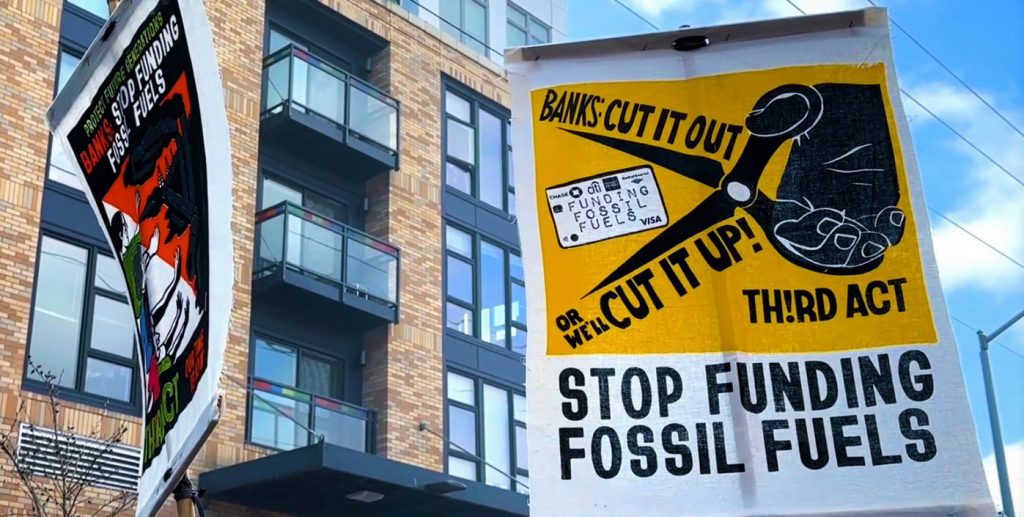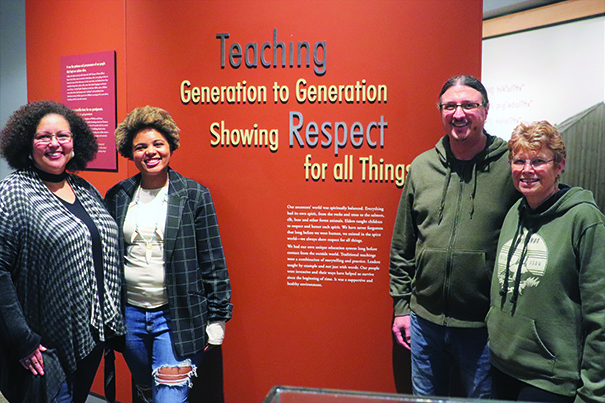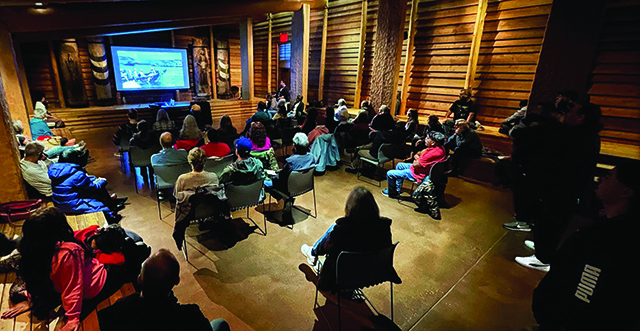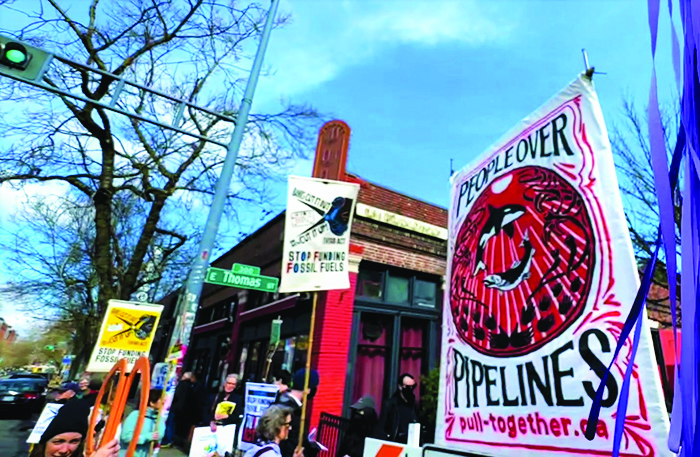
By Micheal Rios, Tulalip News
A unique documentary series featuring the voices of Indigenous climate justice leaders was previewed by ecstatic Hibulb patrons as they sat intently in the cultural center’s makeshift longhouse turned film screening room on a winter afternoon. The one-of-a-kind digital storytelling series is titled Facing The Storm; an ode to the mighty buffalo who don’t cower from a storm, but instead charge into it head on.
“It is my honor to introduce Mikayla Gingrey, a flourishing film maker, and her talented assistant, her mother Marya Gingrey. Both are descendants of the Apache nation,” stated Last Real Indians contributor, Rae Rose. “I have been invited to introduce the upcoming docuseries, Facing The Storm: The Indigenous Response to Climate Change, an Aminata Multimedia Group docuseries.

“Mikayla is using her talent to highlight and document the important stories that often get overlooked, the struggles, the heartbreaking losses, along with the love, and sometimes overlooked triumphs of ordinary people doing extraordinary things.
“These films will highlight Indigenous leaders, activists, and community members who are working towards our collective future,” she continued. “This series is our chance to spotlight the achievements, not usually acknowledged in mainstream media. It is also an important chance to give voice to and shine a light on those who are working to combat climate crisis, and to those providing spaces for healing and growth in our indigenous communities. All with the hope of creating real and lasting change.”
An estimated 70 people filled the longhouse sits, while others willingly stood near the entrance way just to glimpse two parts of the five-part docuseries.

The first episode covered the divestment movement of large financial institutions (think Bank of America and Wells Fargo) who are the primary backers of oil pipelines. Illuminating the people and organizers that became Mazaska Talks, the filmmaker focused on the Indigenous-led Seattle campaign to get the city of Seattle to divest from Wells Fargo.
“When we took on the city of Seattle, so many people reached out from all around the globe who were interested in running similar campaigns on their homelands. This showed us how valuable our work was to the cause and the importance of sharing it online and through social media in order to get the word out through whatever means necessary. We knew the mainstream media wouldn’t tell the story from our perspective,” explained Lakota activist and local Marysville School District Indian Education coordinator, Matt Remle. His tireless activism was instrumental to Seattle officially divesting from Wells Fargo in 2020.
Divestment has proven an historically successful means of resistance for disenfranchised people around the world. South Africa, Sudan, and Burma are just a few places where it has seen success. Divestment is not a magic bullet, but it is a powerful tool to challenge the status quo of placing profits over people. These same banks are backing the new expansion of the DAPL system into the Bayou Bridge pipeline, as well as four proposed tar sands pipelines that together would add over three million barrels of the dirtiest oil in the world to flow across turtle island every single day:
- Keystone XL (TransCanada) – 830,000 barrels per day
- TransMountain (Kinder Morgan) – expansion from 300,000 to 890,000 barrels per day
- Line 3 (Enbridge) – expansion from 390,000 to 915,000 barrels per day
- Energy East (TransCanada) – 1.1 million barrels per day
“While first peoples own, occupy or use 25% of the world’s surface area, we safeguard 80% of the world’s remaining biodiversity. Our identity is in the landscape–the mountains, the rivers, the plants, and the animals. For this reason, we are in a unique position to advocate for the ecosystem our shared human existence,” further explained Matt to the longhouse audience. “But if we are to preserve the Earth as a home for all future generations, we need everyone to help us restore Indigenous and environmental rights. That is where divestment comes in. That is where you come in.”
To learn more about the grass roots movement and how you can support them by divesting from specific financial institutions, please visit MazaskaTalks.org

The second episode of Facing The Storm focused on food sovereignty and how it sustains culture, identity, and positive health outcomes. It tied together the Water Is Life movement with the simple fact salmon is a first and foremost food source for Coast Salish peoples. The episode beautifully wove together teachings from Coast Salish ceremonies and other cultural events that are dedicated to salmon to depict the ancestrally deep roots the tribes have with their land and local waterways.
Although not shown at Hibulb, the filmmaker shared with the still captivated for more attendees that episode three covers the relocation of Quinault’s main village and that episode four is about Tulalip citizen Kayah George and her ongoing resistance movement towards the Trans Mountain Pipeline in Vancouver, B.C.
Following a raucous applause for the contemporary storyteller as the Hibulb film session ended, Mikayla Gingrey took a moment to reflect on the importance of sharing her works on Native land, such as Tulalip.
“It means so much to me to be able to debut the second episode of my series here in Tulalip,” said the thought provoking 25-year-old Mikayla. “My goal for this project is to inspire the next generation of climate justice warriors. In that spirit, to show the series here, I feel honors and pays tribute to the past and present generation of warriors from this region.
“Also, Matt Remle is such a huge mentor to me. He’s built such a strong connection to the Tulalip people through his work in education, and together we share the same mission to educate and inspire the younger people,” she continued. “It’s so important they be empowered and inspired to carry on this legacy of defending Mother Earth, defending the sacred, and defending a basic human right to have clean air and clean water. There’s a space for everyone in the climate justice fight and I want everyone to walk away from the series knowing you can do something, whether its big or small, it all makes an impact.”